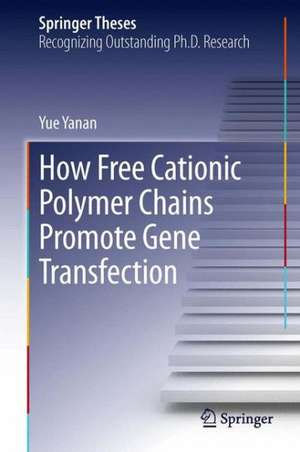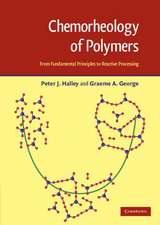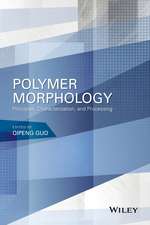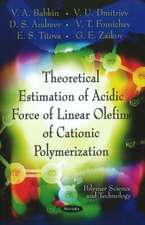How Free Cationic Polymer Chains Promote Gene Transfection: Springer Theses
Autor Yue Yananen Limba Engleză Hardback – 3 iun 2013
| Toate formatele și edițiile | Preț | Express |
|---|---|---|
| Paperback (1) | 631.53 lei 6-8 săpt. | |
| Springer International Publishing – 23 aug 2016 | 631.53 lei 6-8 săpt. | |
| Hardback (1) | 636.30 lei 6-8 săpt. | |
| Springer International Publishing – 3 iun 2013 | 636.30 lei 6-8 săpt. |
Din seria Springer Theses
- 18%
 Preț: 997.88 lei
Preț: 997.88 lei -
 Preț: 389.88 lei
Preț: 389.88 lei - 15%
 Preț: 646.94 lei
Preț: 646.94 lei - 18%
 Preț: 943.43 lei
Preț: 943.43 lei -
 Preț: 399.29 lei
Preț: 399.29 lei - 18%
 Preț: 944.99 lei
Preț: 944.99 lei - 15%
 Preț: 636.80 lei
Preț: 636.80 lei - 18%
 Preț: 941.05 lei
Preț: 941.05 lei - 15%
 Preț: 643.16 lei
Preț: 643.16 lei - 15%
 Preț: 642.68 lei
Preț: 642.68 lei - 18%
 Preț: 1103.62 lei
Preț: 1103.62 lei - 20%
 Preț: 558.83 lei
Preț: 558.83 lei - 18%
 Preț: 1112.30 lei
Preț: 1112.30 lei - 18%
 Preț: 944.19 lei
Preț: 944.19 lei - 18%
 Preț: 1109.92 lei
Preț: 1109.92 lei - 18%
 Preț: 1217.27 lei
Preț: 1217.27 lei - 15%
 Preț: 640.06 lei
Preț: 640.06 lei - 15%
 Preț: 636.45 lei
Preț: 636.45 lei - 15%
 Preț: 640.06 lei
Preț: 640.06 lei - 15%
 Preț: 640.88 lei
Preț: 640.88 lei -
 Preț: 389.70 lei
Preț: 389.70 lei - 20%
 Preț: 563.91 lei
Preț: 563.91 lei -
 Preț: 393.35 lei
Preț: 393.35 lei - 15%
 Preț: 637.93 lei
Preț: 637.93 lei - 15%
 Preț: 641.85 lei
Preț: 641.85 lei - 18%
 Preț: 1225.94 lei
Preț: 1225.94 lei - 20%
 Preț: 551.36 lei
Preț: 551.36 lei - 18%
 Preț: 1229.10 lei
Preț: 1229.10 lei - 15%
 Preț: 639.25 lei
Preț: 639.25 lei - 18%
 Preț: 999.45 lei
Preț: 999.45 lei - 15%
 Preț: 640.06 lei
Preț: 640.06 lei - 18%
 Preț: 1220.45 lei
Preț: 1220.45 lei - 18%
 Preț: 1116.26 lei
Preț: 1116.26 lei - 18%
 Preț: 1110.72 lei
Preț: 1110.72 lei - 18%
 Preț: 1000.87 lei
Preț: 1000.87 lei - 18%
 Preț: 891.17 lei
Preț: 891.17 lei - 15%
 Preț: 640.06 lei
Preț: 640.06 lei - 5%
 Preț: 1154.07 lei
Preț: 1154.07 lei - 15%
 Preț: 635.96 lei
Preț: 635.96 lei - 15%
 Preț: 640.88 lei
Preț: 640.88 lei -
 Preț: 387.20 lei
Preț: 387.20 lei - 18%
 Preț: 1109.92 lei
Preț: 1109.92 lei -
 Preț: 385.25 lei
Preț: 385.25 lei -
 Preț: 385.25 lei
Preț: 385.25 lei - 18%
 Preț: 1112.30 lei
Preț: 1112.30 lei - 18%
 Preț: 999.45 lei
Preț: 999.45 lei -
 Preț: 386.99 lei
Preț: 386.99 lei - 15%
 Preț: 637.13 lei
Preț: 637.13 lei - 20%
 Preț: 554.21 lei
Preț: 554.21 lei - 20%
 Preț: 555.59 lei
Preț: 555.59 lei
Preț: 636.30 lei
Preț vechi: 748.59 lei
-15% Nou
Puncte Express: 954
Preț estimativ în valută:
121.77€ • 132.22$ • 102.29£
121.77€ • 132.22$ • 102.29£
Carte tipărită la comandă
Livrare economică 22 aprilie-06 mai
Preluare comenzi: 021 569.72.76
Specificații
ISBN-13: 9783319003351
ISBN-10: 3319003356
Pagini: 112
Ilustrații: XVIII, 94 p. 45 illus., 38 illus. in color.
Dimensiuni: 155 x 235 x 12 mm
Greutate: 0.3 kg
Ediția:2013
Editura: Springer International Publishing
Colecția Springer
Seria Springer Theses
Locul publicării:Cham, Switzerland
ISBN-10: 3319003356
Pagini: 112
Ilustrații: XVIII, 94 p. 45 illus., 38 illus. in color.
Dimensiuni: 155 x 235 x 12 mm
Greutate: 0.3 kg
Ediția:2013
Editura: Springer International Publishing
Colecția Springer
Seria Springer Theses
Locul publicării:Cham, Switzerland
Public țintă
ResearchCuprins
Introduction and background.- Revisiting complexation between DNA and polyethylenimine: the effect of uncomplexed chains free in the solution mixture on gene transfection.- Revisiting complexation between DNA and polyethylenimine: the effect of length of free polycationic chains on gene transfection.- Quantitative comparison of endocytosis and intracellular trafficking of DNA/polymer complexes in the absence/presence of free polycationic chains.
Textul de pe ultima copertă
In this PhD thesis, Yue Yanan addresses a long-overlooked and critical question in the development of non-viral vectors for gene delivery. The author determines that those uncomplexed and cationic polymer chains free in the solution mixture of polymer and DNA facilitate and promote gene transfection. Furthermore, by using a combination of synthetic chemistry, polymer physics and molecular biology, Yue confirms that it is those cationic polymer chains free in the solution mixture, rather than those bound to DNA chains, that play a decisive role in intracellular trafficking. Instead of the previously proposed and widely accepted “proton sponge” model, the author's group propose a new hypothesis based on the results of several well-designed and decisive experiments. These results show that free polycationic chains with a length of more than ~10 nm are able to partially block the fusion between different endocytic vesicles, including the endocytic-vesicle-to-endolysosome pathway. This thesis is highly original and its results greatly deepen our understanding of polymer-mediated gene transfection. More importantly, it provides new insights into the rational design of next-generation superior polymeric gene-delivery vectors.
Caracteristici
Nominated as an outstanding Ph.D. thesis by the Chinese University of Hong Kong Addresses and elucidates a critical but long overlooked question on non-viral gene delivery Greatly deepens our understanding of polymer-mediated gene transfection, representing a paradigm shift Offers new insights into the rational design of next-generation superior polymeric vectors for gene delivery Includes supplementary material: sn.pub/extras











